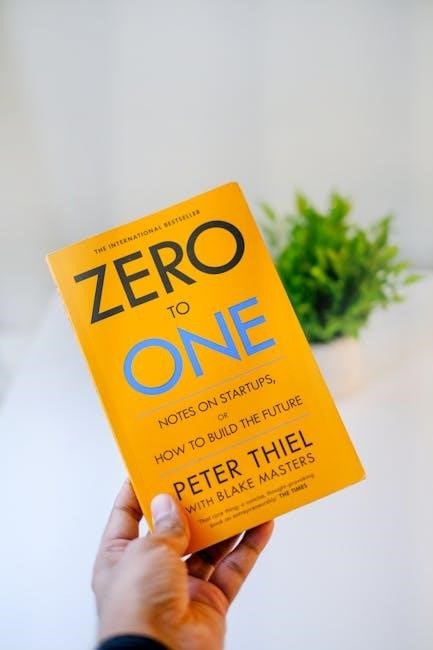Zero to One by Peter Thiel is a groundbreaking guide for entrepreneurs‚ challenging conventional business ideas. It emphasizes innovation‚ monopolistic advantages‚ and the importance of creating unique value to build the future.
Overview of the Book
Zero to One by Peter Thiel is a thought-provoking guide for entrepreneurs and innovators. It challenges traditional business ideas by emphasizing the importance of creating unique value and monopolistic advantages. The book‚ co-written with Blake Masters‚ is based on Thiel’s lectures at Stanford University and explores how to build the future through groundbreaking innovations. Thiel argues that true progress comes from creating something entirely new‚ rather than copying existing models. The book is structured around key lessons‚ such as focusing on a singular vision‚ thinking like a founder‚ and avoiding competition. It has been widely praised for its original insights and has become a must-read for anyone aspiring to create transformative businesses. Endorsements from figures like Elon Musk and Mark Zuckerberg highlight its impact on entrepreneurship and business strategy.
The Author: Peter Thiel
Peter Thiel is a renowned German-American entrepreneur‚ investor‚ and author. Co-founder of PayPal‚ Palantir‚ and Clarion Capital‚ Thiel is a major figure in Silicon Valley and global tech. His experiences as a founder and investor shaped his unique perspective on innovation and entrepreneurship. Thiel’s teachings emphasize originality‚ vision‚ and monopolistic advantages‚ influencing thousands of startups and future entrepreneurs. His work at Stanford University‚ where he taught CS183 on startups‚ laid the foundation for Zero to One. Thiel’s insights and endorsements from notable figures highlight his impact on modern business and strategy. His book challenges traditional ideas‚ offering a fresh perspective on creating value and building the future through innovation.
Key Themes and Concepts
Zero to One explores groundbreaking ideas for building successful ventures. Central themes include the importance of innovation‚ monopolistic advantages‚ and the role of vision in entrepreneurship. Thiel argues that true progress comes from creating something entirely new rather than copying existing models. He emphasizes the value of unique products and services that capture market share and establish long-term dominance. The book also highlights the power of contrarian thinking and the need to challenge conventional wisdom. By focusing on breakthroughs‚ entrepreneurs can create the future rather than merely competing in existing markets. These concepts provide a roadmap for founders aiming to achieve transformative success in a rapidly evolving world.

Downloading and Reading “Zero to One” in PDF Format
Download and read Zero to One by Peter Thiel in PDF format. Find it on platforms like Bookdio or Internet Archive for free access and insights.
Where to Find the PDF Version
To find the PDF version of Zero to One by Peter Thiel‚ you can explore several platforms. Bookdio and Internet Archive are popular options offering free downloads. Additionally‚ Telegram channels and forums like Reddit may have shared links‚ though caution is advised for safety. Always prefer reputable sources to ensure legality and security.
Platforms Offering Free Downloads
Several platforms provide free downloads of Zero to One in PDF format. Bookdio and Internet Archive are notable sources‚ offering direct access to the book. Telegram channels and online forums‚ such as Reddit communities‚ often share download links. Additionally‚ platforms like Archive.org host the PDF version‚ ensuring easy access to readers worldwide. These platforms are popular among entrepreneurs and students seeking insights from Thiel’s groundbreaking ideas without purchasing the book.
Legal and Safe Sources for the eBook
For a legal and safe experience‚ consider purchasing the eBook from authorized platforms like Amazon Kindle‚ Google Books‚ or Barnes & Noble. These platforms ensure high-quality downloads and support the author. Additionally‚ Kobo and Apple Books offer secure and reliable access to the eBook. Always avoid unauthorized sites to prevent downloading pirated copies‚ as they are illegal and may harm your device. Purchasing from reputable sources guarantees a seamless reading experience while respecting copyright laws and supporting the creators. These platforms often provide additional features like adjustable fonts and night reading modes‚ enhancing your overall reading satisfaction.

The Main Ideas of “Zero to One”
Zero to One by Peter Thiel explores innovation‚ monopolistic advantages‚ and creating unique value. He challenges entrepreneurs to envision the future and build groundbreaking businesses.
The Concept of Zero to One
Zero to One introduces the idea of creating something entirely new‚ moving from nothing to something. Peter Thiel argues that true progress comes from uniqueness‚ not iteration. Instead of copying existing businesses (1 to n)‚ entrepreneurs should aim to create monopolies by solving undiscovered problems. This concept challenges traditional business models‚ emphasizing the importance of originality and vision. By focusing on breakthrough innovations‚ companies can achieve long-term success and shape the future. Thiel’s framework encourages thinkers to embrace bold ideas and avoid competition‚ fostering a mindset that values groundbreaking advancements over incremental improvements.
Importance of Innovation and Monopolistic Advantages
In Zero to One‚ Peter Thiel highlights the critical role of innovation and monopolistic advantages in building successful businesses. True innovation creates unique value that cannot be easily replicated‚ allowing companies to dominate their markets. Thiel argues that aiming for monopolies‚ rather than competing in crowded industries‚ is key to long-term success. By solving a specific problem better than anyone else‚ businesses can establish themselves as market leaders. This approach reduces competition and maximizes profitability. Thiel emphasizes that incremental improvements often fail to create lasting impact‚ whereas breakthrough innovations drive transformative change and secure a company’s future. Thus‚ fostering a culture of originality and uniqueness is essential for sustained growth and dominance in any industry.
Role of Vision and Originality in Entrepreneurship
Vision and originality are central to entrepreneurship in Zero to One. Peter Thiel stresses that entrepreneurs must think differently to create value. Visionary leaders anticipate future needs and innovate to meet them. Originality ensures businesses stand out‚ avoiding competition by offering something entirely new. Thiel warns against copying existing models‚ urging founders to seek unique solutions. Visionary thinking enables entrepreneurs to shape the future‚ not just adapt to it. By challenging conventional wisdom and embracing bold ideas‚ entrepreneurs can build transformative companies. Originality and vision are the bedrock of successful startups‚ driving progress and innovation in industries.

Key Lessons from the Book
- Focus on creating unique value to stand out in the market.
- Think like a founder by embracing bold ideas and innovation.
- Build the future through breakthroughs‚ not incremental improvements.
Focus on Creating Unique Value
In Zero to One‚ Peter Thiel stresses the importance of creating unique value to differentiate businesses. This involves solving problems others ignore and offering solutions that cannot be easily replicated. By focusing on specific‚ underserved markets‚ entrepreneurs can build monopolies that dominate their niche. Thiel argues that “going from zero to one” means inventing something entirely new‚ rather than copying existing products. This approach fosters long-term success and discourages competition. The book encourages entrepreneurs to think critically about their offerings and strive for uniqueness‚ ensuring their ventures stand out in a crowded market. This mindset is key to achieving lasting impact and profitability.
Building the Future Through Breakthroughs
In Zero to One‚ Peter Thiel argues that true progress comes from breakthroughs‚ not incremental improvements. He distinguishes between “going from zero to one”—creating something entirely new—and “going from one to n‚” which merely replicates existing ideas. Thiel emphasizes that breakthroughs require bold vision and a willingness to challenge conventional wisdom. By focusing on solving fundamental problems‚ entrepreneurs can create industries and opportunities that previously didn’t exist. For instance‚ companies like PayPal and Palantir succeeded by addressing unmet needs in payment systems and data analysis. Thiel urges founders to aim for radical innovation‚ as these breakthroughs are the foundation of a better future. This mindset encourages entrepreneurs to think ambitiously and strive for transformative change.
Thinking Like a Founder
Thinking like a founder‚ as emphasized in Zero to One‚ involves embracing a mindset of originality and boldness. Founders must see the world differently‚ identifying gaps in the market and creating solutions that others overlook. Peter Thiel argues that true entrepreneurs are not just problem solvers but visionaries who challenge the status quo. This mindset requires confidence in unconventional ideas and the courage to pursue them relentlessly. By fostering a culture of innovation and leadership‚ founders can inspire teams to align behind a shared vision. Thiel underscores the importance of clarity and focus‚ urging entrepreneurs to avoid distractions and concentrate on building something truly unique. This approach not only drives personal success but also contributes to societal progress by creating value where none existed before.

Reception and Reviews
Zero to One received widespread acclaim for its innovative insights‚ with endorsements from Elon Musk and Mark Zuckerberg. It remains a must-read for entrepreneurs‚ sparking both admiration and debate. (Amazon: 4.3/5‚ 9k+ ratings)
Impact on Entrepreneurship and Business Strategy
Zero to One has profoundly influenced modern entrepreneurship by challenging traditional business norms. Peter Thiel’s emphasis on innovation‚ monopolistic advantages‚ and unique value creation has reshaped startup strategies. Entrepreneurs now focus more on solving unprecedented problems rather than competing in saturated markets. The book’s concepts‚ such as “thinking like a founder” and creating breakthroughs‚ have inspired a new wave of ventures aiming to build the future. Its principles are widely adopted in Silicon Valley and beyond‚ making it a cornerstone of entrepreneurial education and business strategy. Thiel’s ideas continue to spark debates and inspire innovators‚ solidifying the book’s role as a seminal work in the field of entrepreneurship.
Endorsements from Notable Figures
Zero to One has garnered praise from influential figures in tech and entrepreneurship. Elon Musk‚ CEO of SpaceX and Tesla‚ described the book as delivering “completely new and refreshing ideas” on creating value. Mark Zuckerberg‚ CEO of Facebook‚ emphasized the importance of reading it twice‚ highlighting its insightful perspectives. Other notable endorsers include Marc Andreessen‚ co-founder of Andreessen Horowitz‚ who praised Thiel’s contrarian yet inspiring views. Nassim Nicholas Taleb also commended the book for its bold and thought-provoking ideas. These endorsements underscore the book’s relevance and influence in shaping modern entrepreneurial thought‚ making it a must-read for innovators and business leaders aiming to create the future. The book’s impact extends beyond startups‚ resonating with anyone interested in groundbreaking ideas and societal progress.
Critical Analysis and Controversies
Zero to One has sparked debates due to its unconventional views on entrepreneurship and monopolies. Critics argue that Thiel’s emphasis on monopolistic advantages may encourage anti-competitive practices. Some also find his dismissal of competition overly pessimistic‚ suggesting it discourages innovation. Additionally‚ Thiel’s focus on technology as the sole driver of progress has been criticized for neglecting social and environmental factors. Despite these criticisms‚ the book remains influential‚ challenging readers to rethink traditional business strategies and innovation. The controversies highlight the provocative nature of Thiel’s ideas‚ fostering ongoing discussions in entrepreneurial and economic circles. The book’s bold perspectives continue to polarize opinions‚ ensuring its relevance in contemporary debates about business and progress.

Practical Applications of the Book’s Concepts
Zero to One offers actionable insights for entrepreneurs‚ emphasizing the importance of creating unique value and leveraging monopolistic advantages. Founders can apply these strategies to build innovative startups and scale breakthrough ideas into successful businesses‚ fostering long-term growth and industry leadership.
How to Apply “Zero to One” in Startups
Applying the principles of Zero to One in startups involves focusing on creating unique value by solving specific problems. Entrepreneurs should aim to build monopolistic advantages‚ avoiding competition by offering something no one else can. Thiel’s concept emphasizes the importance of vision and long-term thinking‚ encouraging founders to identify gaps in the market and fill them with innovative solutions. Startups should prioritize proprietary technology and scalability to achieve sustainable growth. By leveraging these strategies‚ entrepreneurs can create transformative businesses that stand out in the marketplace. Real-world examples‚ such as PayPal and Palantir‚ demonstrate how these principles can lead to groundbreaking success‚ inspiring founders to think boldly and build the future.
Case Studies of Successful Ventures Inspired by the Book
Zero to One has inspired numerous successful ventures by encouraging founders to think differently. Companies like Stripe and Slack exemplify the book’s principles‚ creating unique solutions to unsolved problems. Stripe focused on simplifying online payments‚ while Slack revolutionized workplace communication. Both achieved monopolistic advantages by addressing specific market needs. Similarly‚ startups like Clubhouse and Notion have applied Thiel’s ideas‚ prioritizing innovation over competition. These case studies highlight how focusing on breakthroughs and solving real-world problems can lead to transformative businesses. By following the book’s guidance‚ entrepreneurs continue to build ventures that reshape industries and create lasting impact.
Contrast with Traditional Business Models
Zero to One challenges conventional business approaches by advocating for innovation over competition. Traditional models often focus on incremental improvements in existing markets‚ whereas Thiel’s approach emphasizes creating entirely new categories. While traditional businesses compete in saturated industries‚ Zero to One encourages entrepreneurs to solve unique problems and monopolize new markets. This mindset shifts the focus from fighting for market share to building something no one else can offer. For instance‚ companies like PayPal and Airbnb succeeded by addressing unmet needs rather than replicating existing solutions. By prioritizing originality and vertical progress‚ Thiel’s framework offers a radical alternative to the horizontal‚ competitive nature of traditional business strategies.
